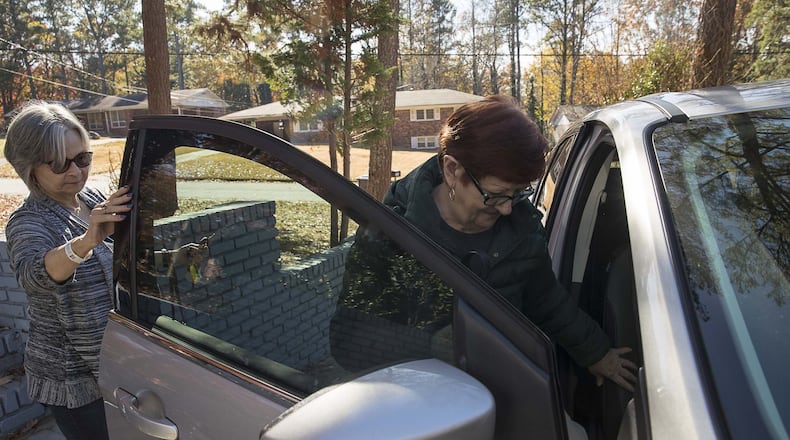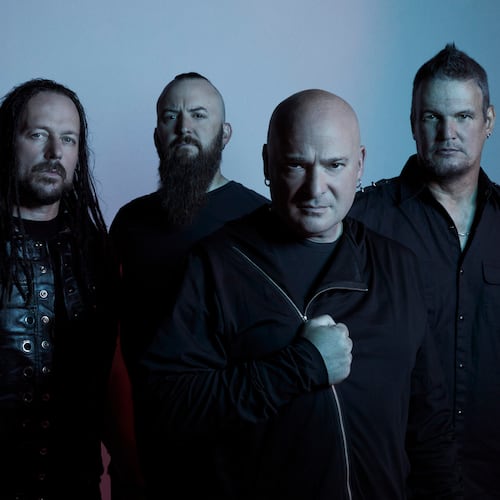Velma Dunn wasn’t having her best day.
She felt glum about her scheduled radiation treatment for breast cancer. To top it off, she was nervous that the stranger giving her a ride to the hospital wouldn’t show up.
But Christopher Milton, a volunteer driver with the American Cancer Society's Road to Recovery program, did show up — not only that afternoon last winter but every Friday after for weeks.
The former DeKalb County police officer filled a crucial void by making sure the Atlanta retiree got to her treatments on the one day a week when none of her friends was available. The importance of that, medical professionals say, shouldn’t be underestimated.
As many as 30 percent of all patients skip doctor appointments, and a key reason, especially for the elderly, is trouble getting to them, according to reports by SCI Solutions, a health care technology firm, and the American Hospital Association. When it comes to cancer, those missed appointments can have a real impact on outcome, doctors say.
That's one of the reasons the American Cancer Society started the volunteer program several years ago.
Last year, the program provided more than 16,000 rides to Georgia cancer patients. The rides are free, regardless of income or age. Right now, there are about 400 volunteer drivers in the state. And that’s not nearly enough, according to program organizers.
In metro Atlanta, about a third of the requests the program receives are unmet because drivers aren’t available. Meanwhile, the demand for rides is growing. The number of cancer patients seeking rides through the program almost doubled to 1,400 in 2018, up from 800 patients the previous year.
When Milton pulled into Dunn’s apartment complex that first day, she gained far more than a driver to get her from point A to point B. Milton would grow into a friend who supported her not just logistically but emotionally, providing words of comfort and someone to talk to.
Credit: Alyssa Pointer
Credit: Alyssa Pointer
The 40-year-old waited at the hospital and drove Dunn back home after radiation treatments. There were no quick goodbyes. He offered Dunn his arm to hold as he helped her walk up a flight of stairs to her apartment. He made sure she was OK before leaving.
“I was not a happy camper, and he kept saying to me, ‘You are going to beat this,’” said Dunn, who is 69.
Rides with compassion
More than 50,400 Georgia residents will be diagnosed with cancer this year. Newly diagnosed cancer patients can face seemingly endless days of appointments, procedures, tests and chemotherapy. The side effects and toll of treatment often make it difficult for patients to drive themselves to appointments. Patients often turn to family and friends for help.
Summer Al-Majed, an oncology social worker at Winship Cancer Institute of Emory University, said patients sometimes resort to public transportation or calling an Uber.
The American Cancer Society also provides vouchers to cancer patients for MARTA and will cover costs for ride-share and cabs for treatment. Still, public transportation is less than optimal, especially for patients with weakened immune systems who should avoid crowded spaces. Also, in metro Atlanta, patients may have to stand and wait at a bus stop and switch buses multiple times because of no direct routes.
Al-Majed said the Road to Recovery is typically her first choice when looking for help for patients who need transportation to Winship. She said other ride services are available through Medicaid and several county senior services agencies. But some have income or age restrictions, or require applications and extensive paperwork. Often, there can be months-long waiting lists.
Meanwhile, Road to Recovery rides can be arranged in as little as three days and can be made by calling the Cancer Society’s help line at 1-800-227-2345.
“If you are getting into a Lyft or an Uber, you don’t necessarily feel comfortable sharing,” said Al-Majed. “It’s very valuable to have someone to drive a patient, who may be super nervous going into an appointment. To have someone give a smile, positive words — I’ve seen the volunteers waiting for patients — it’s super helpful. We just need more volunteers.”
Dana Heyl, Road to Recovery program manager, said many of the volunteer drivers are cancer survivors or have been caregivers for a family member with cancer. Sometimes, as with Dunn and Milton, a bond develops between driver and the patient over the several weeks they regularly see each other.
Giving back
Robin Schiltz, a breast cancer survivor who lives in Berkeley Lake in Gwinnett County, signed up to be a volunteer driver in September. The program asks the drivers commit to at least two rides per month. Schiltz said volunteering is a way to give back, to pay it forward. The 60-year-old dental hygienist often gives rides on Fridays, when she’s not working.
Schiltz gave a ride earlier this year to a woman who was losing her hair to chemotherapy. She gathered up colorful head scarves she no longer needed to give to the woman when she picked her up.
“When you are first diagnosed, you think you are going to die,” said Schiltz, who also underwent treatment for cancer. “It doesn’t matter if your doctor says to you that you are going to be fine. I think it’s helpful to see someone who can say, ‘I am a year out of treatment. I am healthy. My hair is coming back. I am back to running.’ It is nice to see someone on the other side.”
Schiltz recently picked up another woman from an appointment who was reeling from news that her cancer was far more advanced than she was anticipating.
“She kept saying, ‘Gosh, I can’t believe this. I can’t believe this,’” said Schiltz.
Schiltz told her to take deep breaths.
“I told her to look at me — one foot in front of the other.”
Special connections
Milton, who has volunteered with Hosea Feed the Hungry and Homeless and other organizations, signed up to be a volunteer driver with Road to Recovery about two years ago.
Now working as a life coach, Milton, who lives in Atlanta, said his flexible schedule allows him to volunteer every Friday. He spends several hours providing transportation — and companionship.
During Dunn’s cancer treatments last year, she patched together rides, leaning on help from a close friend and filling in the gaps with other transportation services. Sometimes, she took Uber to get to and from her chemotherapy. But when it was time for radiation treatments, which required daily sessions for four weeks, she found she had no ride on Fridays. And that’s when Milton came into the picture.
Milton said he is hesitant to ask too many questions and generally follows the rider’s lead. He believes his experience in law enforcement helps him pick up on body language and subtle cues.
Milton and Dunn hit it off immediately.
Credit: Alyssa Pointer
Credit: Alyssa Pointer
Dunn, retired from the DeKalb County Public Library, was comfortable opening up and telling Milton about how cancer had already impacted her deeply. She lost her husband to colon cancer in 2004, and her daughter Kimberly to the same ailment in 2007. Kimberly was only 37 years old.
“Some days, you feel like you can get through it,” said Dunn. “And some days, you really don’t want to do it, and you are just going through it because you have to.”
Milton said it’s gratifying to help someone in need.
“I’ve always had this mindset that, when someone is weak, you do what you can to lift them up,” he said. “You never know when you yourself might be weak.”
Dunn said she’s been declared cancer-free and she is regaining her strength.
She’s back to line dancing at a local recreation center. She keeps in touch with Milton.
She recently clicked on his Facebook page and saw the following words:
Look for something positive in each day, even if some days you have to look a little harder.
“At first, all I was looking for was a ride,” said Dunn. “But Christopher is such a sweetheart, a lot more came out of it than a ride. I started seeing things in a different light.”
Road to Recovery program
To volunteer, drivers must have a good driving record, a current driver's license, proof of adequate automobile insurance, access to a safe and reliable vehicle, and schedule availability. Volunteer drivers must also complete an online training course. To learn more about the program and to sign up, go to cancer.org/drive.
Cancer cancer patients requesting rides should call the American Cancer Society’s helpline at 1-800-227-2345.
More transportation help for cancer patients
MARTA Mobility
MARTA Mobility provides door-to-door transit for seniors and individuals with disabilities and mobility issues, which can include cancer patients. Residents 65 or older can qualify for discounted Breeze cards. Cancer patients also can apply for discounted trips. Social workers at area cancer treatment centers can look into other resources to help cover the costs of the trips. For more information, call the MARTA Mobility Eligibility Department at 404-848-5389 or go to www.itsmarta.com/marta-mobility.
ICare
A DeKalb County nonprofit that provides free transportation to medical appointments for fixed/low income seniors throughout the county. For more information, call 404-377-2273, or go to www.icareseniors.org.
Angel Wheels to Healing
Angel Wheels to Healing provides non-emergency, long distance ground transportation to financially disadvantaged patients who need rides to treatment. For more information, call 800-768-0238 or go to www.angelwheels.org.
Medicaid transportation help
Southeastrans arranges transportation for Georgia Medicaid recipients residing in counties located in the north Georgia and Atlanta. Transportation is provided to those who are going to Medicaid-billable health-care services and have no other way to get there. For more information, call 404-209-4000 or go to www.southeastrans.com/members/georgia-members-2.
About the Author
Keep Reading
The Latest
Featured










